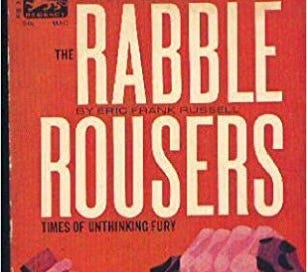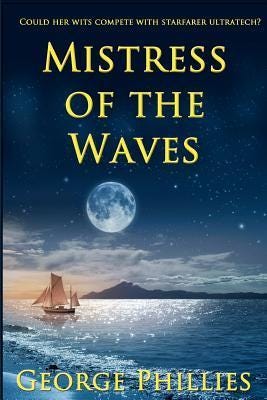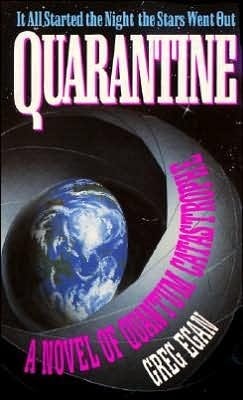More books!
Mistress of the Waves, by George Phillies (294 pp; 2012)
Who should read this? Everyone who likes speculative fiction and economics.
Our young protagonist, who lives on a low-technology colony planet, briefly visits a visiting starship. This inspires her to want to get back into space... so (the starship having left), she sets out building a oceangoing-ship commercial empire so she can afford to build her own spaceship once she finds out how. The rest of the book is about her building that commercial empire (starting from her single fishing boat), in economic detail. We tour some interesting worldbuilding with very original touches, and we meet many other supporting characters with their own motivations. In the process, our protagonist discovers and fights some of the forces keeping her planet in technological stasis.
Eventually another spaceship does arrive. But that doesn't overturn the plot - things continue to build on the previous section, with our protagonist and her world keeping all their agency.
I truly hope this self-published novel doesn't get lost. On the one hand, it's very good, both in appealing narrative voice and innovative worldbuilding. On the other hand, it's a sort of story I've rarely seen before, in several ways. It focuses on economic improvements in detail - our protagonist isn't a single genius inventor or explorer; she's an entrepreneur and trader. And, it's one of the few lost-colony stories I've seen where the colony world finds its own destiny without war. I hope to see more stories like this.
Quarantine, by Greg Egan (280 pp; 1992)
Who should read this? People who're excited by the concept of a novel about quantum mechanics.
I've slowly been reading through science fiction writer Greg Egan's work. He tends to explore theories of physics - sometimes fictional universes where the relationship between space and time is different, and sometimes stories of the future exploring philosophical implications of real-world theories. This book is in the second category: "What if the Copenhagan Interpretation of Quantum Mechanics was real, and there's a specific part of the human brain that does collapse the wavefunction and make there be one universe not a multiverse?"
This's a very interesting take on the multiverse, accepting it as real (in very real ways) and exploring personal identity (among other things) in light of that. As I said in my longer post on fictional portrayals of the multiverse, I find it difficult to accept the conclusions Egan has his characters accepting. To him, the multiverse is real - at least (in this novel) when not collapsed by a human brain - and he digs in and explores the philosophical implications. In some unlikely universe, everything can and does happen. In the "main" universe (according to Egan's premise), the human brain collapses the wavefunction into one universe - so it follows the universe is actually formed within the human mind. This's the sort of novel I haven't found anywhere else: one that actually takes the multiverse seriously!
As in all Egan's works, the star of the novel is the physics, and the characterization suffers in comparison. Here, our protagonist is a well-drawn person, but the secondary characters are two-dimensional at best. Personally, I don't really mind that; I'm reading for the physics. Egan faces his interesting ideas head-on, understands them, explains them, and spreads out their implications very well.
Rabble Rousers, by Eric F. Russell (157 pp; 1963)
Who should read this? Nobody. Well, okay, people interested in the author's own psychology.
This's an account of various incidents of mass hysteria, such as the panic over the radio broadcast of War of the Worlds, or the Dreyfus Affair, or the Red Scare, or the public clamor at the Sacco and Vanzetti trial. Russell recounts it all in a cynical and world-weary tone, looking down alike on the crowds which go hysterical, and on the press and governments who sometimes stir up and manipulate that hysteria to their own ends.
Unfortunately, that's all there is to this book.
Russell seems to rest content in his universal cynicism about mass hysteria, without trying to identify more direct causes for why events sometimes went one way and sometimes another. In his mind, individual heroes can stand up - like Colonel Picquart did to defend Dreyfus - but the government or mob will merely run over them or route around them and render their efforts largely futile. He doesn't dig into things such as how Dreyfus was eventually acquitted in spite of the mob, which forestalls him from building out an actual theory of mass hysteria.
Disturbingly on a different level, his cynicism also means he doesn't notice other differences. He discusses both World Wars as simply governments on both sides stirring up mass hysteria against the enemy - without even mentioning anything else, such as how Hitler actually persecuted and murdered people he hated and invaded other countries unprovoked. Russell seems to treat "the British government stirred up mass hysteria" as sufficient to condemn them and end his study.
This topic area has large potential, and Russell does list out the facts of some interesting-sounding stories. But in the end, his treatment remains superficial - and his ommissions of important background facts about the World Wars mean I can't help wondering if he leaves out similarly-important facts elsewhere. So in the end, I can't recommend this book. I must wait for another book to actually work toward a theory of mass hysteria.
Impact Erebus, by Gordon Vette (347 pp; 1984)
Who should read this? People interested in the details of aviation, mental illusions, or failure investigations.
In 1979, an Air New Zealand sightseeing flight to Antarctica crashed into the slopes of Mount Erebus, which the pilot had not realized was nearby. Everyone on board died. The airline's initial investigation blamed the pilot for flying too low. However, a subsequent royal commission of inquiry noted that the instructions as to minimum height were ambiguous, and - more importantly - the airline had changed the programmed flight plan after the pilot's briefing, without telling him, rendering his maps and expectations incorrect.
Vette, a pilot himself, wrote this book shortly afterwards. It gives the known story of the flight, and pieces together a likely story of what happened in the cockpit (based on sources like the cockpit voice recorder and passengers' photos). He agrees with the royal commission, and further concludes that the pilot literally didn't see Mount Erebus ahead of him: an optical illusion called "sector whiteout" rendered the white snowy mountain invisible against the white cloudy background. The crew hadn't known about sector whiteout, and didn't know their flight plan had been changed to bring them close to the mountain. So, they unknowingly flew straight into the mountain and died.
Sadly, the royal commission's report was overturned, and no further Antarctic siteseeing flights flew until 2013. But, that report and this book have been said to be significant in failure analysis. I can definitely see why; Vette exemplifies carefully following the evidence and calling out multiple causes for events. These are also useful skills in any historian.







